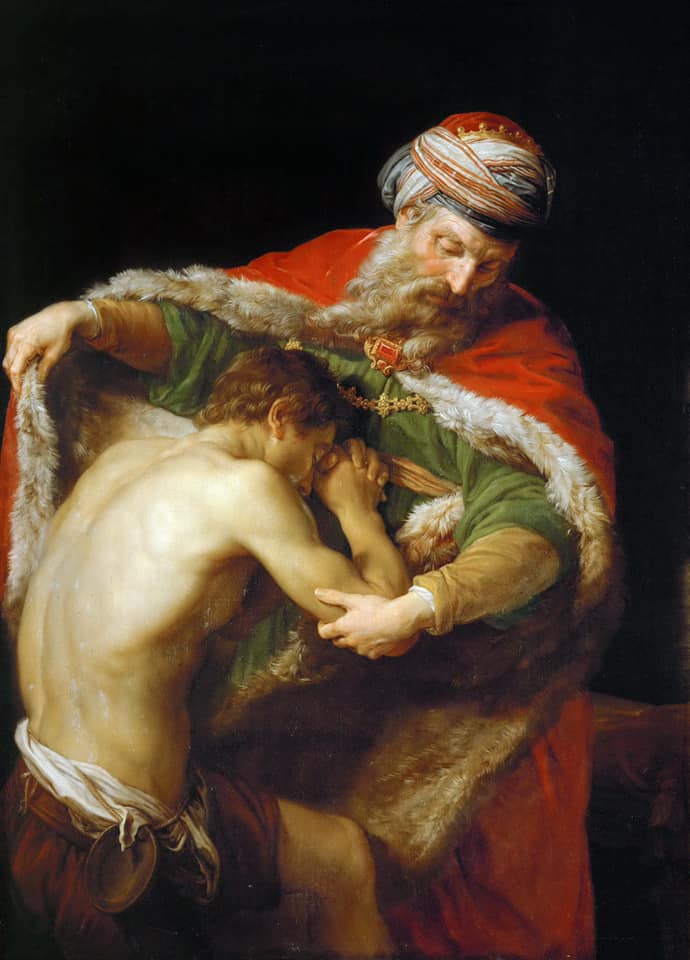 Gospel of 6 March 2021
Gospel of 6 March 2021
Saturday of the Second Week of Lent
Luke 15:1-3,11-32
The prodigal son
The tax collectors and the sinners were all seeking the company of Jesus to hear what he had to say, and the Pharisees and the scribes complained. ‘This man’ they said ‘welcomes sinners and eats with them.’ So he spoke this parable to them:
‘A man had two sons. The younger said to his father, “Father, let me have the share of the estate that would come to me.” So the father divided the property between them. A few days later, the younger son got together everything he had and left for a distant country where he squandered his money on a life of debauchery.
‘When he had spent it all, that country experienced a severe famine, and now he began to feel the pinch, so he hired himself out to one of the local inhabitants who put him on his farm to feed the pigs. And he would willingly have filled his belly with the husks the pigs were eating but no one offered him anything. Then he came to his senses and said, “How many of my father’s paid servants have more food than they want, and here am I dying of hunger! I will leave this place and go to my father and say: Father, I have sinned against heaven and against you; I no longer deserve to be called your son; treat me as one of your paid servants.” So he left the place and went back to his father.
‘While he was still a long way off, his father saw him and was moved with pity. He ran to the boy, clasped him in his arms and kissed him tenderly. Then his son said, “Father, I have sinned against heaven and against you. I no longer deserve to be called your son.” But the father said to his servants, “Quick! Bring out the best robe and put it on him; put a ring on his finger and sandals on his feet. Bring the calf we have been fattening, and kill it; we are going to have a feast, a celebration, because this son of mine was dead and has come back to life; he was lost and is found.” And they began to celebrate.
‘Now the elder son was out in the fields, and on his way back, as he drew near the house, he could hear music and dancing. Calling one of the servants he asked what it was all about. “Your brother has come” replied the servant “and your father has killed the calf we had fattened because he has got him back safe and sound.” He was angry then and refused to go in, and his father came out to plead with him; but he answered his father, “Look, all these years I have slaved for you and never once disobeyed your orders, yet you never offered me so much as a kid for me to celebrate with my friends. But, for this son of yours, when he comes back after swallowing up your property – he and his women – you kill the calf we had been fattening.”
‘The father said, “My son, you are with me always and all I have is yours. But it was only right we should celebrate and rejoice, because your brother here was dead and has come to life; he was lost and is found.”’
Reflexion
It’s easy for us to identify ourselves or others with the various characters in this familiar parable - from the wayward younger son, to the indignant and some would add, unjustly treated elder brother, and then the foggy old father, who seems to be blind to one son’s misdeeds and the other son’s good deeds. The common title given to this parable, the Prodigal Son, seems to put the emphasis on the younger son who squandered his inheritance and then shamelessly returns to his father for what appears to be more exploitation.
But the key to understand this parable is found in the scathing comments made by the Scribes and Pharisees, “This man welcomes sinners and eats with them.” They were commenting about our Lord’s practice of having table fellowship with tax collectors and sinners. The parable is therefore allegorical - the younger son represents the “tax collectors and sinners”, the older son represents the “scribes and Pharisees,” and the father in the story actually represents “Jesus.” The focus of the story is therefore on Jesus, since He is at the centre of this controversy, and His work which receives attention here, is that of “welcoming” sinners.
In Luke’s gospel, God’s Kingdom is already breaking into human lives on earth through the person of Jesus. This is why our Lord tells John’s disciples to report that ‘the blind receive their sight, the lame walk, the lepers are cleansed, the deaf hear, the dead are raised, the poor have good news brought to them’ (Luke 7:22).
Today’s parable confirms this truth. The young man’s father, upon seeing him in his misery, does not celebrate that he has gotten his due. He does not suggest that the boy should wait to receive his redemption in paradise. Rather, he runs and embraces his child in the moment. This is not a parable of a prodigal son but that of a generous father. And who could better make manifest the tender loving mercy of the Heavenly Father than Jesus, His only begotten Son. As Pope Francis tells us, that “Jesus Christ is the face of the Father’s mercy.” If you recognise that you are a sinner that needs our Lord’s embrace, run into His encircling arms because He “welcomes sinners and eats with them.”
